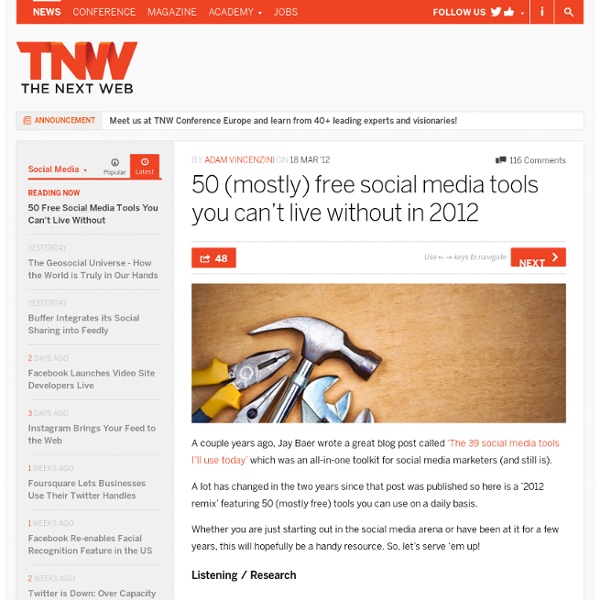Social Business Intelligence: Positioning a Strategic Lens on Opportunity
Recently I’ve been tracking the growth of social analytics and the means of delivering well on it. Connecting analytics to the needs of the business is the next step beyond basics of collating, aggregating, and identifying patterns in what the world is doing that affects your organization. On ZDNet recently, I explored the rapidly growing trend of big data.
10 Ways a Social Intranet Can Help You Cut Down on Email
Social intranets benefit the enterprise by facilitating communication. The ability to connect with others through the intranet reduces our reliance on email which tends to be slower and less effective than tools like instant messaging and microblogs. Besides, we lose a significant amount of time and productivity every day, because we have to process so much email. In this post, I’m going to show how many of the things you are currently accomplishing with email can easily be replaced by internal social networking applications. These apps often do an even better job than emails, especially if you want immediate response or better archiving.
[STUDY] How Americans Feel About Personalized Search & Targeted Ads
A new report out today from the fabulous folks at Pew reveals something that you, Internet user, probably already know. Most Americans are "anxious" about the personal information that search engines and websites collect from them, according to the study. The majority of 'Net users disapprove: 65% say that search engines collecting information is a bad thing because it narrows the type of information you'll get online, effectively creating a Filter Bubble type effect. Conversely, only 29% think search engines collecting information to shape future search results is a good thing because it tailors searches to you.
Facebook Innovation Briefing
It’s not often that brands are willing to share the mistakes that occurred during their social media campaigns, even though those are often the most valuable insights. Therefore it was very refreshing to hear Radio France’s head of digital marketing Virginie Cleve talk through a few of the things that didn’t go to plan when the business embarked on a new social strategy. Cleve was speaking at Socialbakers’ Engage NYC event today where she revealed that the public broadcaster, which has more than 5m daily listeners and attracts 3.5m unique visitors per month to its website, redesigned its digital marketing strategy in 2011 with a new focus on editorial.
PEG · Knowledge Workers in the British Raj
Note: This is the second part of a longer series on how social media is affecting management. You can find the first post – The future of (knowledge) work – and subsequent posts – The north-south divide, Working in Hollywood, World of Warcraft in the workplace and Problems and the people who solve them – elsewhere on this blog. Prior to the industrial revolution, most folk, apart from apprentices and other people in training, worked for themselves. Home wasn’t here and work wasn’t there: they were in the same place and tightly intertwined.
Even on $15,000 a Year, Most Young People Buy Smartphones [STUDY]
When a twentysomething's budget is tight, her smartphone is far from the first expense to go, suggests a new study from Nielsen. The survey of 20,000 U.S. mobile customers found that smartphone ownership skews toward the young and the wealthy — exactly as you'd expect. What is more surprising, however, is this nugget: smartphone penetration among young people in the lowest income bracket is higher than it is among older people in the wealthiest bracket. Among 18- to 24-year-olds, more than half of respondents who make less than $15,000 each year said they own a smartphone. This might be explained if the parents of many college-age students footing their children's phone bills. Still, even in the next oldest, post-college age group, the percentage of those in the same income bracket who own a smartphone was a mere 13% lower.
Metcalfe’s Law and Social Media
Metcalfe’s Law Metcalf’s law in its simplest form assigns a value for a network. The value increases proportionally depending on the number of nodes the network contains. For a network with 5 nodes, or computers such as a simple office intranet, the computed value would be 5² or 25.
Long View: Jane Hart
Principal and Director of Collaboration Internet Time Alliance Bath, United Kingdom An independent consultant, speaker, and writer, Jane Hart is an internationally known specialist in the use of social media for learning and working. She is a principal of the Internet Time Alliance, a think tank of leading practitioners who help organizations exploit emerging practices to work smarter. Hart is also the founder of the Centre for Learning & Performance Technologies (C4LPT), a free resource site on the use of technologies for learning and performance, which has become one of the world's most visited websites about learning with more than 100,000 visits per month. A prolific blogger, for many years, Hart has posted a daily learning resource on the popular Jane's Pick of the Day, and she posts regularly on her Learning in the Social Workplace blog. She holds a master's degree in information systems and technology from the City University in London, United Kingdom.
H&M Under Fire for Using Fake, Computer-Generated Models
Recently, Swedish fashion chain H&M came forth and admitted to using computer-generated models to showcase a range of collections on its website. The virtual models look completely human, but if you look closely, they all have the same body shape and pose. The real model’s head has been superimposed on the body and the skin tone has been digitally altered to match her complexion.



